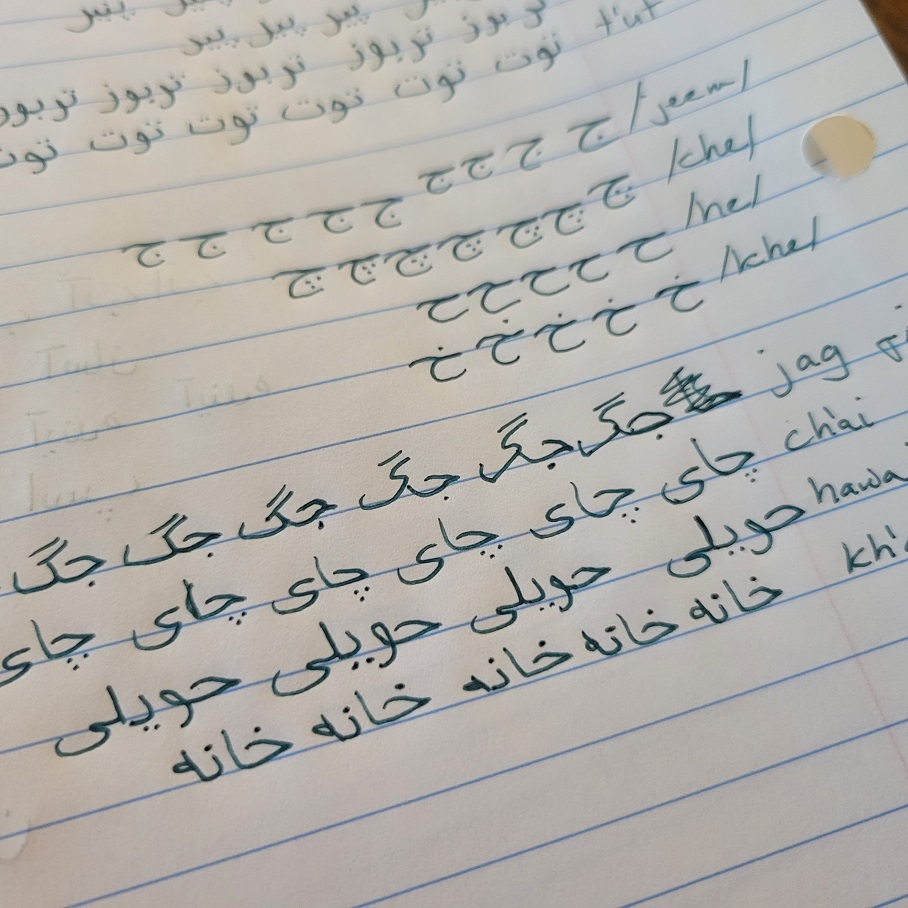Language
-
Not a Bad Beginning
This afternoon, preparing to read and pray through Lamentations 2 in the morning, I jumped into John Goldingay’s NICOT offering, The Book of Lamentations. I will have to go back and read the introductory material soon. But for now, right into the meat of the poem! Lamentations 2 The following made me stop for a bit, both for its own merit, and for a failure on my part to grasp a word. There was a sense in which the temple belonged in the heavens. It linked the earth and the heavens. The earthly temple was a kind of portal. When people entered the temple, they entered Yahweh’s heavenly dwelling. But…
-
Prep Day!
-
A Little Bit of Written Dari
This afternoon I completed lessons one and two in Beginner’s Dari (Hippocrene’s Beginner Series). I had to stop after lesson 2, as my hand was cramping up. There is a learning curve, and the group of letters jeem, che, he and khe were causing me a bit of difficulty to execute with any sort of similarity to their printed beauty. Then again, I think my green Sarasa pen does add a certain je ne sais quoi to the study of Dari. Lesson one covered only one letter, aleph. Lesson two, as you can see above, covered two groups of similar looking letters. The first set was be, pe, te and…
-
Sabbatical Progress – Week 1
So, today was the first Sunday of my September sabbatical. It’s been a restful time so far, and that time has also been put to some good use! Thought I’d stop a moment each Sunday and consider the week. Primarily, this is a help to me, helping me remember what God is doing. So, for starters, there has been a bunch of prayer. Prayer for my local church, prayer for my wife and kids, prayer for direction. Especially, I’ve been in prayer asking God to raise up leaders and servants, and to provide opportunities for purposeful discipleship. I actually jump-started my sabbatical finishing one of my first reading goals. The…
-
In The Mail – Elementary Hebrew Texts
Woohoo! Hebrew textbooks and Old Testament hermeneutics in the mail. Can’t complain about that. This upcoming semester I’m taking 20400 WW, otherwise known as “Elementary Hebrew”, with Dr. Garrett. There are two textbooks (really a book and an associated workbook), two recommended texts, plus an extra credit book. So, for text and workbook, and the extra credit, all pictured above, I’ll be working with: A Modern Grammar for Biblical Hebrew and A Modern Grammar for Biblical Hebrew Workbook and The Problem of the Old Testament: Hermeneutical, Schematic & Theological Approaches (Extra Credit) The “recommended” texts are A Concise Hebrew and Aramaic Lexicon of the Old Testament and Biblia Hebraica Stuttgartensia…
-
Out with the New, In with the Old
Week 6 of 8 is almost complete for spring term 2 (Introduction to New Testament I). I’ve enjoyed Dr. Pennington quite a lot. Nevertheless, time to start planning and registering for summer and fall. To that end, I signed up to take Introduction to Old Testament I over the summer with Dr. Betts, and then in the fall, consuming both terms, will be Elementary Hebrew with Dr. Garrett. I think they usually suggest Greek first, then Hebrew – and I can understand it at least on the fact that Greek is closer to English than Hebrew is. If it is a first or even second time doing another language, it…
-
The Special Case of Conversation
I found myself laughing quite loudly, and re-reading this passage to my wife to help her share in my enjoyment. I’m not sure I succeeded, but I will share with you all nonetheless. The subject is conversation, and in the specific passage, the authors are beginning to illuminate the “presupposition pool”. Even more specifically, the idea that speakers naturally exclude or include content based on these shared concepts. …Any speaker will necessarily make certain assumptions about his listeners and will fashion what he has to say accordingly. For example, he will not unnecessarily explain such technical terms as he may use unless he is fairly sure that explanation is required;…
-
Linguistics & Biblical Interpretation
So far, I’m very much enjoying Linguistics & Biblical Interpretation, by Cotterell & Turner. Very easy to read and understand, as it strives to lay a foundation for the value of linguistically-supported study of Scripture. I found the following, from the chapter on the pitfalls of word studies, interesting: …my concept of ‘boy’ in the more general usage may include very many features concerning the range of their features and physique, their hygiene, their habits of play, their social abilities and limitations, and so forth, none of which is linguistically attached to the word ‘boy’ as such at all. The sentences (1) Boys are usually male,(2) Boys are usually unkind,…
-
One Afternoon In May
As I finished my last call of the workday, the power went in and out a couple times in quick succession. Then, it stayed out (it is back on now, surprisingly). It has been very windy, so I went outside to see if something had caused any damage to the house. First, I found a package from Michael Aubrey on my doorstep: All arrived in good condition! Michael and his wife, Rachel, are in the process of some big changes, so he was looking at whittling down some of his book weight. I jumped at the chance to “help”. From his blog: For ourselves (Michael and Rachel Aubrey), we are currently…
-
In The Mail: Lexical Semantics
I spend (likely) too much time over at Nerdy Language Majors. Between that and Koine-Greek, I always have something new and interesting to learn and grapple with. And sometimes, it is useful just to find books worth picking up. So, HT to Keith Surland for pointing out Lexical Semantics of the Greek New Testament, by Nida & Louw, a week or so back. I look forward to spending time in it soon!


